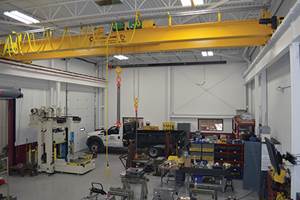New Tax Rules for Employee Parking Expenses
The qualified transportation fringe with the greatest impact on mold builders is qualified parking provided to their employees at no cost.
If mold shops are unfamiliar with the term Qualified Transportation Fringes (QTFs), they will know the term when they file their 2018 Federal income tax return. The reason is the Tax Cuts and Jobs Act (the Act), which does not allow any deduction for QTFs provided by mold shops to their employees, and is effective for amounts paid or incurred after December 31, 2017.
QTFs include any transportation in a commuter highway vehicle between the employee’s residence and place of employment, any transit pass and qualified parking, which is defined as parking provided to an employee on or near the business premises of the employer, or on or near a location from which the employee commutes to work. The QTF with the greatest impact on mold builders is qualified parking, as many shops provide parking for their employees at no cost to the employee.
If mold shops are unfamiliar with the term Qualified Transportation Fringes (QTFs), they will know the term when they file their 2018 Federal income tax return.
The Act does not help to determine the amount of nondeductible QTF, but proposed guidance from the IRS is forthcoming. The method chosen depends upon whether the mold shop pays a third party to provide parking for its employees. For example, the lot is not directly owned by the shop or its owners, or the shop owns or leases a parking facility where its employees park.
Generally, the amount of nondeductible expenditures is the shop’s total annual cost of employee parking paid to a third party. If the monthly cost of parking is less than $260 per employee, the entire amount is treated as nondeductible. If the monthly cost is more than $260, the amount up to $260 per employee is nondeductible and the excess amount is treated as compensation to the employee and the shop can treat it as a deductible.
Generally, the amount of nondeductible expenditures is the shop’s total annual cost of employee parking paid to a third party.
The IRS recommends the following steps to determine the amount of nondeductible expenses:
- Step 1: Calculate the disallowance for reserved employee spots.
- Step 2: Determine the primary use of remaining spots (non-reserved employee spots, general public parking, customer parking).
- Step 3: Calculate the allowance for reserved non-employee spots.
- Step 4: Determine the remaining use and allocable expenses by calculating the number of spots, the number of employees, the hours of use, or other measures.
Parking expenditures include, but are not limited to, repairs, maintenance, allocable utility costs, property taxes, insurance, allocable interest expense, snow and ice removal, trash removal, leaf removal, cleaning, landscape costs, and security expenditures.
Tool shops will likely benefit by developing processes, along with internal controls, on how to account for expenditures related to employee parking and the related tax reporting requirements.
For More Information
Mueller Prost / 314-862-2070 / mdevereux@muellerprost.com / muellerprost.com
About the Contributors
Michael J. Devereux II, CPA, CMP is a partner and director of manufacturing, distribution and plastics industry services, Joel Hundelt, CPA is a senior tax manager and Timothy O’Neill CPS is a tax supervisor at Mueller Prost.
Related Content
The Trifecta of Competitive Toolmaking
Process, technology and people form the foundations of the business philosophy in place at Eifel Mold & Engineering.
Read MoreHow to Improve Your Current Efficiency Rate
An alternative approach to taking on more EDM-intensive work when technology and personnel investment is not an option.
Read MoreMaking Quick and Easy Kaizen Work for Your Shop
Within each person is unlimited creative potential to improve shop operations.
Read MoreThink Safety: Eliminate Hazards Throughout the Shop
The tooling community is taking advantage of new products for safer mold shops and molding facilities.
Read MoreRead Next
Tax Reform: Changing the Rules of Business Losses
The Tax Cuts and Jobs Act has changed the way many mold builders account for their business losses. The new rules impact the tax treatment for business losses regardless of a company’s structure.
Read MoreReasons to Use Fiber Lasers for Mold Cleaning
Fiber lasers offer a simplicity, speed, control and portability, minimizing mold cleaning risks.
Read MoreHow to Use Continuing Education to Remain Competitive in Moldmaking
Continued training helps moldmakers make tooling decisions and properly use the latest cutting tool to efficiently machine high-quality molds.
Read More





















